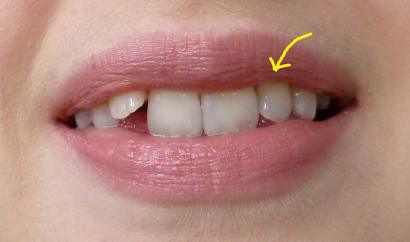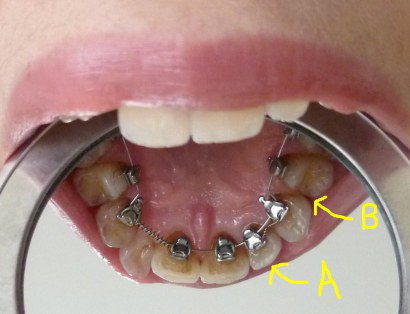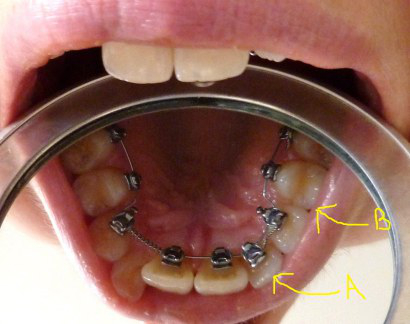It’s now one month since my top brace was fitted and two weeks since my bottom brace went on, so I thought I’d post an update. The main piece of news is…
MY TEETH HAVE MOVED!!!
With an 18-22 month estimate for my treatment time, I am amazed that there are noticeable differences in the position of my teeth so soon!
The main difference is with the tooth marked with the arrow. It’s hard to see from the photo but it’s now flush with the teeth on either side – it used to project forwards (like the tooth on the opposite side, but not as much). You can see a bit better by comparing pictures of the inside of my mouth (upper arch) below. Also, the gap that appeared at the end of week 2 has completely closed.
Arrow A shows the tooth in question. Comparing the photo below (taken on day 2 with my lingual braces) you can see that it’s not angled as much and is now in line with the front tooth.
Arrow B shows the gap that it opening up between these two teeth, creating space for everything to move into.
Below is the day 2 photo again so you can compare:
Maybe it’s just the different light/angle in the photos, but does the whole arch look a little bit wider to you? It’s hard to tell but I suppose it could be?
………………………………………………………………………………………………………………………………………………………………….
IN OTHER NEWS:
Speech: My lisp is still there, but getting much better. It’s worse when I’m chattering too fast and also in the afternoons when I’m tired. I can also definitely notice that my speech is worse immediately after I’ve eaten as the little bits stuck in my brace (yuk, sorry) do make speaking more difficult. I am brushing my teeth straight after each meal to help this (it also makes the whole thing feel a lot nicer too).
Pain / eating: I am still only at the end of week two with my lower brace and I can definitely feel the front four lower teeth aching when I touch them or bite into anything. I tried to bite into a chocolate chip cookie the other day and it was so sore I couldn’t even bite through it. Had to throw it away which was awful! Chocolate mousse has become my saviour.
Staining: Despite brushing my teeth six times a day (four times with a manual brush and twice with an electric brush) I’ve noticed that the biting surfaces of my teeth are becoming quite badly stained. I’m hoping it’s just discolouration rather than decay but I will ask next time I go to the orthodontist. I am due to go for my first hygienist appointment in about three weeks too (my ortho recommends going every three months during treatment) so hopefully that will remove the worst of it.
Overall: I’m feeling pretty good! Seeing ‘proof’ that my teeth are actually moving so soon is a real morale booster and I am starting to get used to my braces – there have actually been brief moments when I’ve forgotten they’re there which feels a big step. It’s actually quite mentally exhausting to be aware of the metal in your mouth 12 hours a day!






